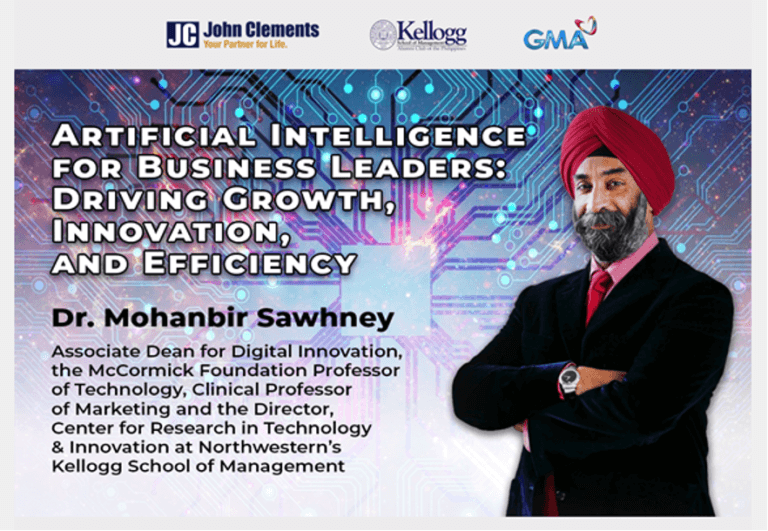Last July 17, 2023, I attended an intensive one-day workshop on Artificial Intelligence, which is now an undeniable component of business transformation. Dr. Mohanbir Sawhney of Northwestern University and Kellogg School of Management led the discussion, in partnership with the GMA Network and John Clements Consultants, and was held at the Dusit Thani Hotel in Makati.
Before we deep-dive into this, what exactly is Artificial intelligence? It is a term we hear all the time but probably have a vague idea of what it encompasses. The next section will explain more about AI and its subtypes.

Subtypes of AI
We all know that Artificial Intelligence is progressing, and since it is progressing, everything else must progress with it – businesses being no exception. In this digital age, businesses must adapt to grow. But more than that is the need to understand AI and its sub types: Machine Learning, Deep Learning and Generative AI.
Artificial Intelligence (AI) is a branch of computer science that aims to create machines capable of performing tasks that typically require human intelligence. These tasks include learning from experience, understanding natural language, recognizing patterns, solving problems, and making decisions. The ultimate goal of AI is to develop systems that can exhibit cognitive abilities similar to humans, such as reasoning, perception, and decision-making.
One of its subtypes, Generative AI, is an AI algorithm that is trained in large data sets to produce new, previously unseen data. It has shown significant progress and has the potential to revolutionize various industries, including entertainment, design, and content creation. There are challenges, such as avoiding biases in generated content and ensuring that the AI systems produce ethically sound and safe outputs. Research in generative AI continues to advance rapidly, and it remains an exciting and evolving area within the field of artificial intelligence. Other subtypes include:
- Machine Learning – an algorithm whose performance improves as it is exposed to more data over time.The machine improves as it gets more data and makes more predictions– no need to be explicitly programmed. It is less brittle; no human intervention needed.
- Deep Learning – a subset of machine learning in which multi-layered neutral networks are used to mimic the human brain. It is a special type of ML that mimics the human brain by using a multi-layered hierarchical neural network to recognize complex patterns in text, speech, images, and videos.
Creating an AI Strategy
Creating an AI strategy is essential for organizations looking to leverage the potential of artificial intelligence to achieve their goals and gain a competitive edge. An effective AI strategy involves careful planning, understanding your organization’s needs, and addressing challenges.


AI in Marketing, Sales and Customer Service
AI has revolutionized various aspects of marketing, sales, and customer service, enhancing efficiency, personalization, and customer experience. So, how exactly is AI involved in Marketing, Sales, and Customer Service?

It is very evident in digital payment and online shopping nowadays, as well as viewing content in social media apps. Does it show you similar videos of content you liked before? That is one fine example of the algorithm working in the shadows.

AI continues to advance rapidly in these areas, and its applications are continually expanding. By leveraging AI effectively, businesses can gain competitive advantage by offering improved customer experiences, more targeted marketing campaigns, and streamlined sales processes.
AI has an undeniable transformative impact on various aspects of business operations, optimizing processes, improving efficiency, and driving innovation. The ability of AI to analyze vast amounts of data, make predictions, and automate processes, has the potential to revolutionize various industries and drive continued growth and competitiveness. And we must learn to use it properly.
The Future of AI
With all these revolutionizing and improvements coming our way, what lies in the future for AI?
The future of AI holds immense potential and promises to bring about significant changes across various domains, which we are seeing now. While predicting the exact trajectory of AI’s development is challenging, several trends and possibilities are emerging based on current advancements and ongoing research.
It is essential to recognize that the future of AI also comes with challenges. Ensuring that AI systems are developed ethically, securely, and with consideration for societal impact is crucial. AI does not have ethical values after all. As much as it is provides a big help to all of us, it is important to recognize that we play a big part in using it. We are the ones who provide that data after all, and we must be responsible in providing the right data and logic for it to have a better outcome.
Addressing issues like job displacement, bias, and privacy will be paramount in realizing the full potential of AI for the benefit of humanity, too. As the field of AI continues to evolve, responsible and thoughtful development and deployment will be fundamental in shaping a positive future for Artificial Intelligence.
What I have realized from all these is that Artificial Intelligence should not be viewed as a threat, as it cannot be used properly without human intervention. It is not the be-all and the end-all of everything, but what we do feed AI is crucial to us – and to the future of humanity.




